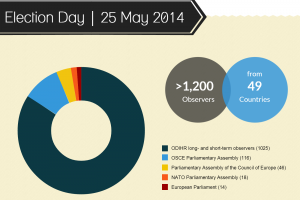Monitoring Ukraine’s presidential election
It had been a time of great upheavals for Ukraine, but there was also hope when our 24-member core team opened its office in Kyiv on 20 March. Following an official invitation to observe the 25 May 2014 early presidential election, the quick response from the OSCE Office for Democratic Institutions and Human Rights (ODIHR) signalled commitment and support for Ukraine's democratic process. With 100 Long Term Observers deployed across the country by 29 March, I was part of the largest election observation mission in the organization's history.
Observing the election and challenges
On election day more than 1,200 observers from 49 countries were reporting across Ukraine. We were in the country long enough to observe election preparations from the start. Our observers were present in all regions except the Autonomous Republic of Crimea and Sevastopol, where no voting took place. During our time in the country we witnessed growing turmoil in the eastern regions of Donetsk and Luhansk, where in early April public administration buildings began to be occupied by armed people. Protests and occasional clashes spread to nearby regions, culminating in the dramatic incident on 2 May in which 46 people lost their lives in Odessa. The counter-insurgency operations operation that began on 14 April was still under way when we left the country on 7 June.
Yet, in spite of these huge challenges, the electoral authorities sustained their efforts to conduct the election throughout the country to the very end, and in all regions but two election preparations proceeded without outside interference
According to our observation, close to four million voters in the troubled regions of Donetsk and Luhansk were deprived of the possibility of voting as a result of the violent turmoil. One of my vivid memories from this election is the reports we continued to receive from our long-term observers in those two regions describing the attempts by some election commission members to maintain the election process, even as the violence mounted and they became the targets of direct threats and intimidation.
We understood that motivation was high. For all their differences, all but one of the candidates and supporting party leaders we spoke to saw the election as a necessary step towards the stabilization of the country. This view was shared by the members of government, NGO representatives and media commentators whom we met. Many of our interlocutors told us how important it was that we were present at this sensitive juncture.
Assessing the election
Together with our parliamentary partners, we were able to make a positive assessment of the election, declaring that it was largely in line with international commitments and fundamental freedoms.
Violence in the east was not the only challenge. Election preparations had to be made in a shortened time frame and an uncertain economic and political context. It is, therefore, all the more noteworthy that in the course of this election both the electoral authorities and the acting government of Ukraine created some positive new precedents, which hopefully will remain embedded both in national practice and public expectations.
We commended the members of the Central Election Commission for the independence, impartiality and efficiency they sustained throughout the election period. They were collegial and open in decision-making and this deserves to be preserved. Another positive development was the fact that we received no reports of misuse of state resources by presidential candidates or their supporters. Here again, a government order to all regional governors to abstain from supporting, covertly or overtly, any of the candidates, signalled political commitment to what should remain an abiding principle.
Another welcome initiative which was taken during our watch was the adoption of a long-promised law transforming the state television company into a public-service broadcaster, in line with previous ODIHR recommendations. This law now has to be put into effect, but its objectives of impartial coverage are particularly important in a media environment in which corporate interests remain preponderant. As for the dangerous work of all journalists in the east, some of whom I was able to meet on a visit in April to Donetsk, it remains unacceptable that media outlets and journalists should continue to be the targets of threats and harassment.
Election day was the climax of a long and, in many ways, extraordinary mission. There were technical difficulties, and, in some places, long queues, but the overall assessment of our observers was positive. The weather, first a blazing sun, then storm, did not appear to deter voters. Most importantly, the outcome was not challenged by any of the participants.
For many of the polling staff it was a very long day and night. It is therefore worth noting that special thanks for this successful election should be given to a national polling staff of whom 71 per-cent were women. In a political system still largely dominated by men, it is the women who shouldered the bulk of election work on that crucial day.
Ukraine’s 2014 Early Presidential Election in Numbers
Check out the OSCE/ODIHR infographic, which explores election observers' findings and key statistics from Ukraine's early presidential vote on 25 May.
Tana de Zulueta was the Head of the ODIHR election observation mission for the 25 May 2014 early presidential election in Ukraine.



